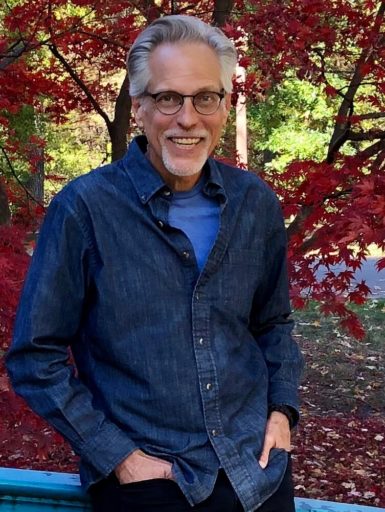We recently spoke with author John Pleimann about his new Slant book, Come Shivering to Collect.
What is the background of your book’s title?
It’s the title of a poem that deals with a child knocking at the speaker’s door and the child’s ominous interaction with the speaker. The title seems to capture a mood that permeates the book. At the heart of what drives a lot of us is the need to return, recoup, revise. To do so one must be humble but strident. That sort of tension causes a body to shiver because so much is at stake—the desire to heal some wound, enact justice, fulfill some infinite emptiness.
Who are these shadowy women who appear in several of your poems?
Perhaps they are some aspect of myself that I only feel safe exploring by slipping outside of my male gender. Maybe these are forays into integrating my Jungian anima and animus. The same thing could be said about the second-person voice in the book. Who is this “you” the speaker addresses? We are all bumping into our shadows, confronting our contradictions, hypocrisies, and twisted logic. I say bumping into because full confrontation is often too painful to acknowledge. Art, of course, catches us off guard, gives us the distance and safety to approach. And, as Collette said, you need to “look for a long time at what pleases you, and longer still at what pains you….”
Did you begin the book with any specific theme?
Whatever dropped into my thoughts, obsessed my subconscious mind, or lurked at the periphery was open for being made into a poem. I allow words to work me, so I can stay slightly out of control. Some poems begin from mere wordplay, rubbing one word against another to see if sparks catch. One poem came about as I was simply playing with the words “Platonic” and “plate tectonic.” I kept repeating them and realized the words sound similar but are diametrically opposed in meaning: Platonic as in ultimate abstraction vs. plate tectonic one of the most powerful physical forces on our planet. So, I asked myself how these colliding words might work as metaphor for strain in a relationship: “As if the words Platonic and plate tectonic / drift over one another from a blue background of atonement”—and then I followed.
In another poem, I imagine the etymology of my surname as though my ancestors were plowmen, and I then tried that metaphor of turning earth for the poet’s task of “turning words / back to life, to light not stellar / but diffuse, like moonlight spread // across some field I must cross / by foot, by dream, by shadow.”
Animals figure prominently in many of the poems.
Animals help me find my way home. What a gift to be able to share this life with them. They draw me into a place of healing, humility, and profound joy. I can sit for hours in a dog park watching dogs revel in the sheer joy of dogginess. I can do a half hour, easily, watching squirrels chase each other around a tree trunk. Not only do I find them beautiful, intelligent, and playful, I love learning to read them and communicate with them.
Years ago, I interviewed a woman who had a hybrid wolf/dog at her animal sanctuary. He was not street-legal, and she kept him in a separate enclosure. She hesitated when I asked her if I could go into the enclosure with him, but I think she sensed a comfort between us. When he came over to me, he jumped up and put a paw on each shoulder and we looked into each other’s eyes. What did we say to each other, I wonder? Whatever it was, I felt honored. Whitman got it right when he said of animals “[t]hey bring me tokens of myself, they evince them plainly in their / possession. // I wonder where they get those tokens, / Did I pass that way huge times ago and negligently drop them?” I need their primal presence in me.
Your poems seem formal, with a keen ear for craft, and yet none seem written in a conventional form. Any thoughts on this quality?
I expect a poem to take me in, take me under quickly. I was an advertising copywriter for seven years, so I wrote knowing the reader, viewer, listener was ready to turn the page or switch the channel if I didn’t grab them fast. I expect the same in a poem. I revise with an eye and ear for specific elements of craft such as diction, tone, meter, but I don’t think about these things while writing. I have read and analyzed the poetry of others long enough to better incorporate these craft elements without thinking about them as I write. Listen to bebop jazz if you want to hear this happening at high velocity.
There is an art and a craft to the poetry trade. Some of my favorite suggestions from Pound’s list of “A Few Don’ts” include “Use no superfluous word, no adjective which does not reveal something” and “Don’t imagine that the art of poetry is any simpler than the art of music, or that you can please the expert before you have spent at least as much effort on the art of verse as an average piano teacher spends on the art of music.”
Richard Hugo’s The Triggering Town helped reinforce the discipline of craft by reminding me that seemingly invisible words such as “and,” “while,” “so” need not always be said. The reader will get the relationship these words set up without them explicitly stated. Hugo implies you might be violating guidelines of the poetic trade if you find yourself using them. He says they “often indicate a momentary lack of faith in the imagination.”
This reminds me of an anecdote, apocryphal or not, I once heard about Miles Davis chastising a guitarist at Davis’s recording session after the guitarist had just finished a blazing guitar solo. Davis supposedly said to him, “Man, you play a lot of notes, but you don’t need to. If you play the right ones, we’ll hear the other ones, too.”
What influences shaped you as a writer?
Hearing Paul McCartney sing “wearing the face that she keeps in a jar by the door, who is it for” when I was ten years old; hearing Bob Dylan sing “to dance beneath the diamond sky with one hand waving free, silhouetted by the sea, circled by the circus sands with all memory and fate driven deep beneath the waves”; hearing the speaker in Wallace Stevens’s “The Idea of Order at Key West” say “She sang beyond the genius of the sea. The water never formed to mind or voice….”
These are moments I recall a door swinging open inside me for the power of words, the movement of words. Wallace Stevens, though, opened the portals of poetic imagination for me. The spell of his driving iambic meter, the philosophic aesthetics given flesh as in the closing lines of “Sunday Morning”: “At evening, casual flocks of pigeons make / Ambiguous undulations as they sink, / Downward to darkness, on extended wings.” And to speak with such confidence as though he were a prophet come down from the mountain. Which he was—but for the purpose of illuminating that art is as close as we come to heaven, this heaven on earth in art.
I can’t help but think I was also influenced by the physicality of language, having to memorize all those Bible passages in King James Version during my Lutheran grade school years. Whitman and Lincoln, I think also cite the KJV as forming their sonic love of language.





